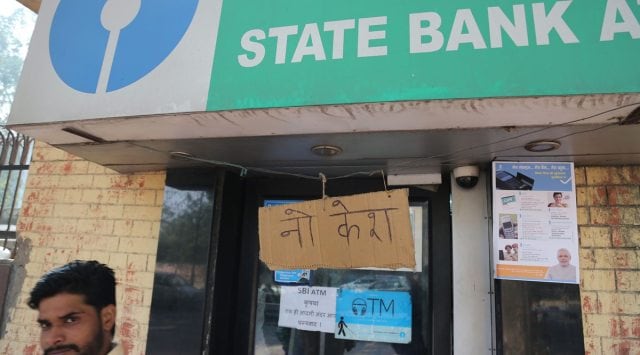Stay updated with the latest - Click here to follow us on Instagram
Demonetisation move ‘unlawful’: What Justice B V Nagarathna said while dissenting with SC’s majority ruling
Justice B V Nagarathna said that records show no independent application of mind by RBI. "Notification of November 8, 2018 is unlawful," she noted.
 Factory workers waiting for cash outside SBI ATM in Chandigarh on Thursday, December 08 2016. (Express photo by Jaipal Singh)
Factory workers waiting for cash outside SBI ATM in Chandigarh on Thursday, December 08 2016. (Express photo by Jaipal Singh) While the Supreme Court on Monday upheld the Centre’s decision, taken on November 8, 2016, to demonetise Rs 500, and Rs 1000 notes, Justice B V Nagarathna, who was part of the 5-judge bench, differed with the majority order. In her judgment, Justice Nagarathna asserted that the scrapping of Rs 500, Rs 1,000 series notes had to be done through legislation, and not through notification. She also differed from the majority’s view on point of the Centre’s powers under section 26(2) of RBI Act.
“When the proposal for demonetisation originates from the Central Govt, it is not under Section 26(2) RBI Act. It is to be way of legislation, and if secrecy is needed, then by way of an Ordinance,” said Justice B V Nagarathna.
The top court by a 4:1 majority verdict upheld the Centre’s 2016 decision on demonetisation.
Justice Nagarathna: records show no independent application of mind by RBI. Notification of Nov 8, 2018 is unlawful and action of demonetisation of currency notes is vitiated. @IndianExpress
— Ananthakrishnan G (@axidentaljourno) January 2, 2023
Calling the notification of Nov 8, 2018 “unlawful”, Justice Nagarathna said there was no independent application of mind by the Reserve Bank of India. “Records show no independent application of mind by RBI. Notification of Nov 8, 2018, is unlawful and action of demonetisation of currency notes is vitiated,” said Nagarathna.
However, she observed that demonetisation was the Centre’s initiative to address disparate evils. “Beyond pale of doubt that it was well-intentioned..demonstrates foresight. No suggestion that it was motivated by anything but best intentions and noble objects for the betterment of the nation. However, she maintained that the measure has been regarded as unlawful only on a purely legalistic analysis of the relevant provisions of the Act and not on the objects of demonetisation.
The majority ruling rejected the petitioners’ argument that under Sec 26(2) of the RBI Act, the government can’t demonetise all series of notes of a denomination. The apex court said it can’t be restricted to mean that the power can be exercised only for one series and not all. “My views on each of the questions have differed from Justice Gavai’s response to the questions he has framed. If demonetisation is to be initiated by the central govt, such power is to be derived from Entry 36 of List I which speaks of currency, coinage, legal tender, and foreign exchange.” She added, “The judgement proposed by Gavai J does not recognise that Act does not envisage initiation of the demonetisation of banknotes by the central govt.
Also Read in Gujarati: Click Here







